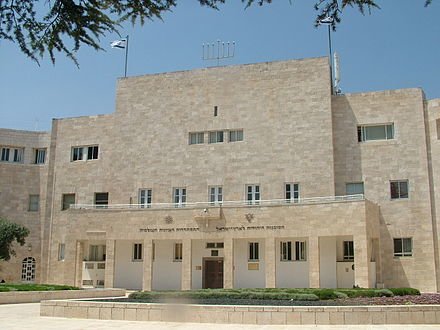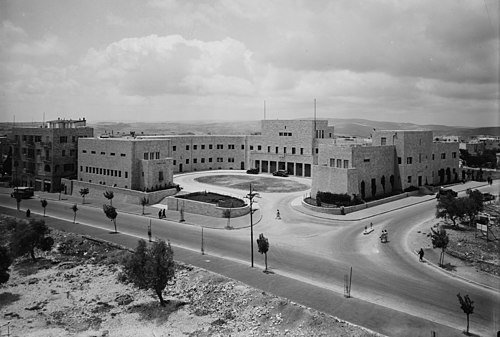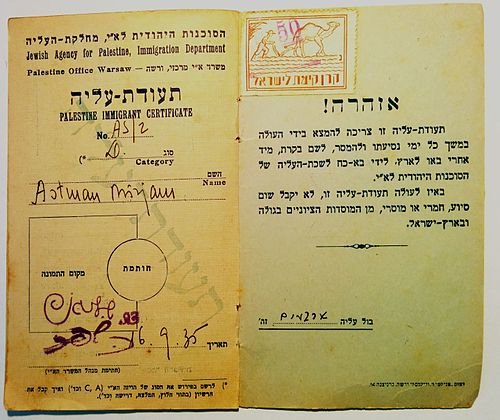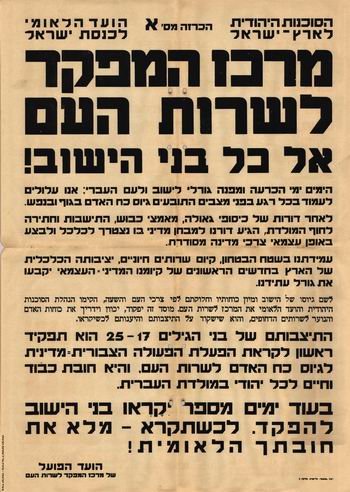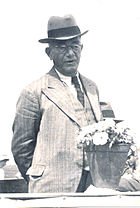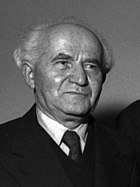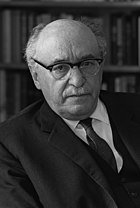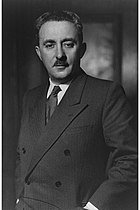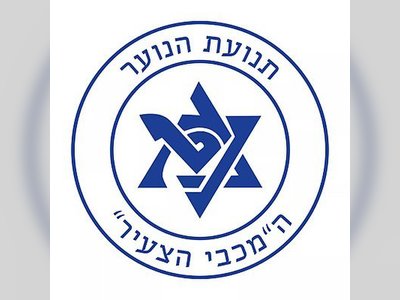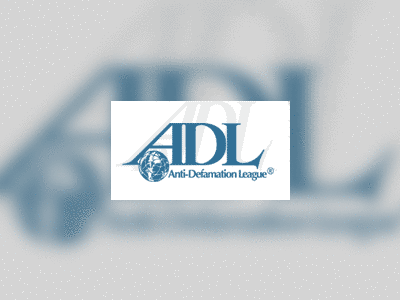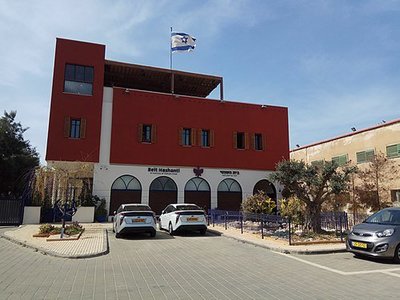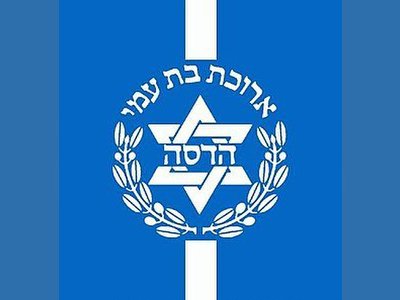The Jewish Agency for Israel
Commonly referred to as "The Jewish Agency," is a global Jewish organization headquartered in Israel. The Jewish Agency holds a strategic partnership with the Israeli government, and its legal and public standing is enshrined in the "Status Law" passed in 1950. The organization operates primarily on donations and collaborations with contributors from around the world and within Israel, with its main office located in Jerusalem's National Institutions Building.
The Jewish Agency was established in 1929 as the operational arm of the World Zionist Organization. According to Article 4 of the British Mandate, the Jewish Agency was designated as the liaison between the Jewish settlement in Palestine (then known as Eretz Yisrael) and the British Mandate. In practice, during the period of British Mandate, the Jewish Agency functioned as the de facto governing body of the Jewish community in Palestine.
With the establishment of the state of Israel, the responsibilities of governing the country were transferred to the Israeli government, and the Jewish Agency shifted its focus to three main areas:
1. Aliyah (Immigration): The Jewish Agency played a vital role in facilitating Jewish immigration to Israel, working to bring Jews from around the world to their ancestral homeland.
2. Education: It was instrumental in promoting Jewish education, especially in the Diaspora, to strengthen Jewish identity and connection to Israel.
3. Partnership with the Israeli Government: The Jewish Agency maintains a unique partnership with the Israeli government, coordinating various aspects of Jewish life and development in Israel and the Diaspora.
In 1920, the British Mandate over Palestine was approved by the League of Nations. According to the Mandate, the British government was required to consult on economic, social, and other matters with a "Jewish Agency" that would be established to fulfill the promises of the Balfour Declaration regarding the establishment of a national home for the Jewish people. From 1920 to 1929, the "Zionist Executive" carried out the functions that were intended for the Jewish Agency.
In December 1929, the Jewish Agency established the "Information Service of the United Bureau" in response to growing intelligence needs, both vis-à-vis the British and the Arab populations, which were not being adequately addressed. This service operated agents and intelligence-gathering activities, including telephone tapping, in various ways, and engaged in psychological warfare. In 1931, the "United Bureau" was disbanded due to budgetary issues and criticisms regarding its operations. Its personnel were incorporated into the "Political Department" of the Jewish Agency, established two years earlier.
Following the Fourth Aliyah crisis, the Zionist leadership sought financial resources to strengthen the Jewish settlement. Chaim Weizmann believed that with the help of wealthy Jews, significant funds could be raised to support Zionist activities. He established a connection with Louis Marshall, who served as the head of the American Jewish Committee (a non-Zionist Jewish organization focused on safeguarding the rights of Jews outside the United States).
On January 2, 1927, the two leaders resolved their differences and signed an agreement known as the Weizmann-Marshall Agreement, which led to the formation of the Jewish Agency. In the wake of this agreement, two committees were established, the "Agency Committee" and the "Expert Committee," which came to Palestine to collect data and make recommendations.
These committees were intended to be non-partisan and were tasked with recommending possible actions suitable for the land and its conditions, as well as recommending the necessary budget for implementing their recommendations.
In August 1929, during the 16th Zionist Congress held in Zurich, representatives from 26 countries declared the establishment of "The Jewish Agency for Israel." Dr. Chaim Weizmann, who was also the President of the World Zionist Organization, was appointed as its first president.
Among the non-Zionist individuals who participated in the foundational congress were Albert Einstein, Leon Blum, and Louis Marshall, prominent figures in American Jewry. The central organization of German citizens of the Jewish faith in Germany debated whether to join the Jewish Agency but ultimately decided not to, with a majority of 48 votes against 35.
Activities During the British Mandate Period:
Upon its establishment, the Jewish Agency organized its departments. The Political Department dealt with the settlement's foreign relations. Other departments included the Security Department, Immigration Department, and Education Department.
During the early years of its operation, the Jewish settlement's affairs were managed by the National Council, which was elected through a democratic process by the Jewish community in Palestine. This led to tensions and disputes over the distribution of authority.
In 1937, disagreements arose over defining the status of the settlement as a "state in the making" and the role of the Jewish Agency as its leadership (or government) as a "state in the making." As a result, the expanded Jewish Agency disintegrated in 1938. An attempt was made in 1938 to revive the expanded Jewish Agency, but it failed, leading non-Zionist elements to leave the agency. This created a clear distinction between the Jewish Agency's leadership and the World Zionist Organization.
The Jewish Agency, in collaboration with the National Council, effectively governed the Jewish community in Palestine. They were responsible for managing various domestic matters, including:
David Ben-Gurion served as the head of the Jewish Agency from 1935 to 1948, while key figures in its Political Department included Chaim Arlosoroff (1931–1933) and Moshe Sharett (1933–1948). With the establishment of the state of Israel, most of the Jewish Agency's responsibilities were transferred to the temporary government led by David Ben-Gurion.
UNSCOP (United Nations Special Committee on Palestine):
UNSCOP, an international inquiry committee established by the United Nations General Assembly in May 1947, was tasked with examining the issue of Palestine. This followed the British government's request for the UN to make a decision on Palestine after failing to reach an agreement on a preferred solution.
Jewish Agency representatives Abba Eban and David Horowitz, along with Moshe Tov, a Spanish-speaking spokesman, were appointed as liaison officers by the Jewish Agency's Political Department. Their efforts significantly influenced the members of the committee and led to the acceptance of the partition plan.
The Bombing of the Jewish Agency Building in Jerusalem:
The National Institutions Building in Jerusalem, which housed the offices of the Jewish Agency (as well as those of the Jewish National Fund and the National Council), had been a symbol of Jewish governance in Israel. In a daring act, an Arab employee of the American Consulate in Jerusalem successfully infiltrated the building's shared inner courtyard on March 11, 1948. He detonated a car bomb, resulting in the deaths of 12 individuals, including Arieh Leib Yaffe, the head of the Jewish National Fund, and injuring approximately 40 others.
Post-Statehood Roles:
Following the establishment of the State of Israel, the Jewish Agency's main responsibilities centered around Aliyah and absorption, Jewish-Zionist education in the Diaspora, and strengthening Israeli society. The administrative handling of immigration candidates abroad, carried out by the Jewish Agency's overseas offices and local emissaries, was placed in the hands of the Israeli government.
Since the State's inception, the Jewish Agency has played a crucial role in fostering the connections between Jews around the world and the State of Israel. It continues to be a vital institution in Jewish life and the promotion of Jewish identity and Zionism.
- הסוכנות היהודיתhe.wikipedia.org

